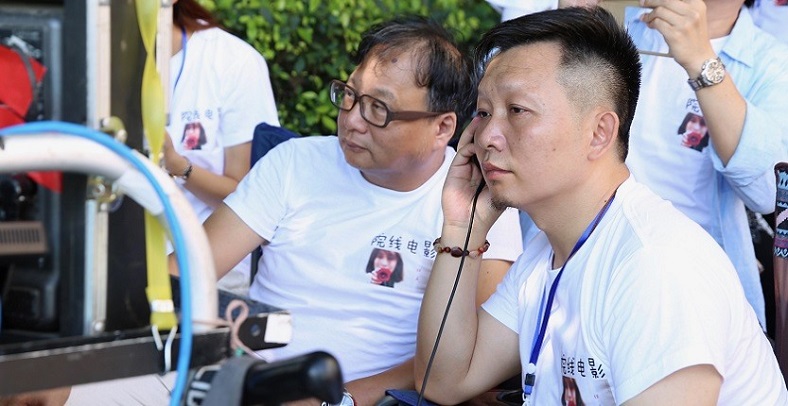Last Updated on April 12, 2020
Difficulties in terms of financing, production, and promotion are the common problems we indie filmmakers face. However, it is our greatest achievement to finish our films and let some people watch them.
Wiseman Wang
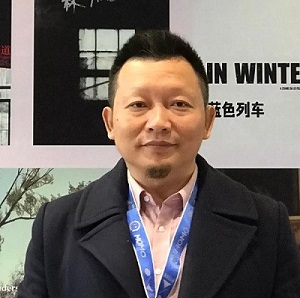
Wiseman Wang’s introduction and his works distributed by Orient Indie Films.
All About Journey to the South
Q: Journey to the South comes with background of China successfully bidding for the 2001 Olympic Games and booming economy. The leading role Bing suffered a lot on his way to the south. Where does the inspiration of these plots come from?
Wiseman Wang: I often look for materials from real life when making movies. The inspiration first come from a true little story I heard, but it is not enough to support the whole film. Therefore, I include some cases happening in the society to form the core story. There are many details in my film that I have heard from some friends before. I have also interviewed some big truck drivers and seen a lot of reports.
This is a bit like director Zhangke Jia‘s film A Touch of Sin. Director Jia caught up some hot issues as the inspiration of the story. Of course, I made this film earlier. This is not to compare with him, but this is simply a way of making films.
In addition, the faster the economic develops, the more human nature dark sides and evils we can see. At that time, the economy was booming, but it brought many problems as well. As creators, we actually need to care about human nature more. This is what our works really need to express. Since the economy is good, we should pay even more attention to those low and middle class poor people.
Q: The Chinese name of the film in English is journey to the “north” while its official English name is Journey to the South. Why is that?
Wiseman Wang: This involves in the different naming principles of Chinese and English titles. English cares about fact and Chinese focuses on meaning. Our Chinese title name in English is journey to the “north”, which means that (the heart) going towards cold and despair. But the English title is because the journey is from north to south (from Jiangsu to Guangdong and Hainan.)
Besides, the film is similar to the classic Chinese literature Journey to the West. There the leading roles constantly fight monsters on the way to become a Buddha. However, although the leading role Bing in Journey to the South achieves his goal, it is hard to say his becomes a Buddha or a demon. The real world is cruel, and sometimes there is no other way to fight evil without being worse.
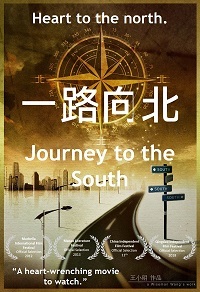
Q: Why did you choose hand-held shooting with semi-documentary style for this film?
Wiseman Wang: This film is quite real in terms of story and the way of expression. If I make a gorgeous commercial movie, audience will think that the story is fictional, and credibility is thus low. There were two main considerations when we decided to shoot with a hand-held camera. The first one was suitability as the film is a bit like a documentary. Being cheated to pay along the journey was real as well.
The other one was cost as this is an indie film without a lot of budget. At that time, we chose to shoot with a small team. Therefore, there was no way to capture these details and some performance things with excellent camera language. In the end, the most important thing is to make a film with the most suitable way to tell its story.
Q: Bing grins and bears it in early stage. However, his resistance in the final stage somehow comes with small people’s survival wisdom. What makes this shift?
Wiseman Wang: According to my understanding of some ordinary people in China, a lot of them are simply submissive. This is because they feel that they can’t fight against the society. Or they think this is a normal social rule and it is them who don’t know the rules. However, all obedience finally leads to irrational outbursts. There are many people who suddenly take great revenge to the society in the end.
When it comes to Bing’s fighting, I would rather say it’s survival cowardice. But in the end who can accomplish the survival wisdom depends on what he has experienced and learned. Rome isn’t built in one day. Some of the corruption and ugliness that have taken place in the real world have been long-term issues. Just like there is no killing without buying and selling. These evil people will become more and more rampant and brazen because there is always someone to pay for this ugly cowardice. This is the sense of realism in the film.
Q: Did you face any difficulties during the shooting?
Wiseman Wang: We made the film at the end of 2011. The shooting lasted 45 days, but there were many difficulties.
The first was funding. When I was preparing, an independent film festival in Hong Kong was willing to co-produce by contributing some funds. But later, their sponsor provided a very high-end oil tanker. It was not in line with the plot and we could not use it in the film, so they had to cancel the sponsorship. At that time, I already used my own money to make the first film The Debts, so I have trouble of lacking funds.
However, I still decided to shoot since I had done most of the preparations. Besides, I considered it as a now or never thing. Therefore, I maxed out all my credit cards, and I redeemed my kid’s insurance which lost some money. In the end, it cost about 200,000RMB to kick start the shooting. But later, many crews quit during the shooting because I was not able to pay them. In the most difficult time we went out to shoot with only four people. One was myself to be the director, driver, and various logistics producer. Others were the leading role Bing, a cameraman, and a small assistant who followed us to push recording equipment.
The leading role Bing’s real name is Jim Wang. He is actually a director who graduated from a film academy and is now a lawyer. At that time, my first film The Debts inspired him, and he thought I should develop my talent in this respect. So he was very supportive and played the leading role in my second film for free. He gave up all his livelihood work and left Beijing to go to Guangdong with me for almost two months to make this film.
Later in such a difficult circumstance, we managed to finish shooting. Then I went back to post production without any money left. I had no energy to invite anyone to involve in. Everyone was very tired as well. Every day I did post-production by myself for seven or eight months.
After we finished this film, there were still many problems in promotion and distribution. Because it was an indie film, there was no way to promote it in many channels. Later, my film was selected at the 11th China Independent Film Festival. After that, slowly there were some people paying attention to this film. We had screenings in various areas of the country.
In 2015, we co-work with iQiyi to launch the film as one of the first batch of online films. At that time, the audience size of iQiyi was still relatively small. We thus managed to recover some cost but still lost money on the whole. However, this film still made many people realize my creative ability and personal style. When I went to a fifth-tier city at the end of 2013, I met several friends. Some of them were really my fans and had seen the film and were very impressed. So I was very happy to see a good mature work would continue to pass down.
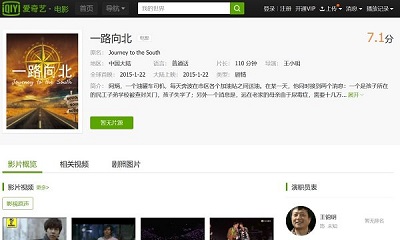
Read endorsement and subscribe now to watch Journey to the South online with 20% off! And stay notified about Asia-related insights & latest offers.
All About The Debts
Q: In 2010, you also made a film The Debts which won many awards. We notice that this film’s Chinese name and poster design are quite special. Could you introduce a bit?
Wiseman Wang: The Debts was my first film, and I made it because of the story itself and out of an impulse. A decade ago, people in Guangdong and Hainan provinces were very crazy about lottery tickets. Everyone gambled and was eager to get rich overnight.
A friend of mine rewrote the lyrics of The Yellow River Cantata into the description of ordinary people’s determination to become a millionaire. Then I made this into a film to satirize China’s abnormal ecology. It shows that everyone only cares about money and the strong bullies the weak. Also because it was my first film, I chose the most familiar hometown to shoot.
The English translation of The Debts’ Chinese name is big city with happiness. This is kind of satire as this film is actually about small town with scandal. Take a look at the film poster carefully, you would notice that the red word of the Chinese name on it is composed of three Chinese characters of “喜” (happiness). It looks like the double-happiness symbol (refer to image below), but with one extra 喜.
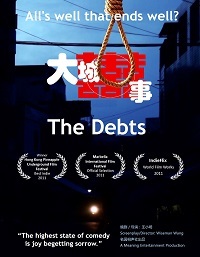
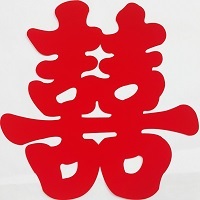
The double-happiness symbol is referring to two happiness that the two persons are getting married to become one family. That’s why the two words are put together to become one word, the symbol. Whenever Chinese see this symbol, they would think of a wedding. The triple-happiness symbol used on the poster, however, comes with unnecessary extra one 喜 to imply problems.
It is known in ancient China from the Four Happiness Poem that the luckiest and happiest things in one’s life lies in four important moments. In The Debts, the four happiness simply become problems.
| Four Happiness Poem | The Debts |
| have a welcome rain after a long drought | suddenly win the lottery and then in huge debt (flooding) |
| run across an old friend in a distant place | the old friend turns out to be a creditor |
| spend the wedding night | keep a secret mistress |
| success in the government examination | have money-for-government position deals |
Read endorsement and subscribe now to watch The Debts online with 20% off! And stay notified about Asia-related insights & latest offers.
Journey to the South vs. The Debts
Q: What are the similarities and differences between The Debts and Journey to the South?
Wiseman Wang: The Debts is not quite unified in shooting methods and style. But oddly enough, both films have its own fans, and it is hard to say which is better. There are seven or eight roles in The Debts to reflect the society. It talks about gambling, money for government position deals, underworld, keeping secret mistresses, collusion between government and business, etc.
Learn more about how local audiences think about issues presented in The Debts.
Journey to the South starts from a small person and also reflects social problems. They are demolition, illegal labor, education of migrant worker’s children, illegal fees, and government-business corruption as well. This film makes audience wonder whether the suffering poor people in the country can find a breakthrough.
Learn more about how local audiences think about issues presented in Journey to the South.
In fact, in 2016 there was still a real case that a couple saved money to buy a car. But the traffic police fined them a large amount of money on purpose. They couldn’t repay the load and committed suicide as a result. During the public screening of this film, there were also audiences sharing similar experiences from their families. It showed that such tragedies are stilling happening over and over again.
The main idea and direction of the two films are not quite the same, so they are not quite the same style of films. It is just because I wrote and shot both of them, there are some consistent personal styles. The Debts is a black comedy movie which utilizes joy to contrast sadness. On the other hand, Journey to the South utilizes sadness to contrast joy. Therefore, many people think they are sister films.
Q: Quite a few years have passed, how do you evaluate the two films now?
Wiseman Wang: I have finished the fifth feature film now. I also used commercial techniques to make some better and more beautiful films. However, no matter how advanced the technology is and how beautiful my technique is now, these two films reflect my first feelings towards films and express original thoughts. Although they are more rough and naïve, undeniably they are the traces on the road of growth. Now that I have more social roles to play, I am somehow more afraid to create freely and more concerns.
Q: Both films reflect reality and focus on the grass roots. Do you have any preference on the theme?
Wiseman Wang: I am not very good at making up stories. I have to have experience and thinking before I can write and shoot them. Therefore, most of them are realistic subjects. I can’t handle fantasy and fiction movies very well. I’m still more confident about reality subject and people’s true feelings.
Over the years, I start to have some changes by studying art house, Taoism, and Buddhism films. I used to study science and technology and think based on logic, but I’m also slowly moving to other directions. I now have two art house film projects on hand. However, I also make art house films based on the basis of realistic themes.
Wiseman Wang and Filmmaking
Q: You used to be a Xiangsheng performer. How did this experience affect your filmmaking?
Wiseman Wang: Xiangsheng has been my hobby since my childhood. Before I graduated from university, I performed in a special show, which has a great influence on my creation. It taught me how to tell a story and how to seize audience’s emotions step by step. Therefore, now when I write a movie screenplay, I can handle techniques and framework well. These are all good influences that Xiangsheng brings me.
Q: Who do you become a director? Which filmmaker has had a great influence on you?
Wiseman Wang: I have enjoyed movies since young, but I never had the chance to study in a professional college. However, I spent a lot of time in the film academy, doing many plays and writing scripts. Why not make a film by myself since I don’t like other people’s? That was the earliest idea I had as a director.
For me, one of the most inspiring directors is Zhangke Jia who also started out as an independent filmmaker. It was my honor to walk the red carpet with him in PYIFF. He also recommended my new film to professional media since he is the chairman of the film festival. Then there is Ang Lee, a director who combines art and entertainment perfectly.
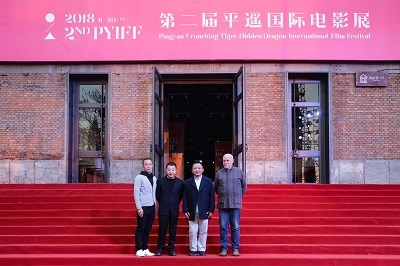
Q: What are your plans for the future?
Wiseman Wang: I would like to follow the creative line of director Ang Lee. I will try to strike the balance between art and entertainment and trigger human nature thinking at the same time. However, I’m still far away from him because he is a master in this industry already. I’m a grass root, but I will continue to climb up step by step.
In 2016, I planned to shoot 10 feature films in the next ten years. I shot two films in 2016, one in 2017, no film in 2018. Besides, I will shoot two more in 2019 and complete the rest of five in the next 5 years. I might be the kind of director who needs to practice more in order to grow. In the future, I can’t expect to be a great director, but I will work hard.
Reference: Liangjie Culture Media
Subscribe now to watch Journey to the South and The Debts online with 20% off! And stay notified about Asia-related insights & latest offers.
If you have any questions for Wiseman Wang, leave a comment below. We will reach out to him and post his answer.

